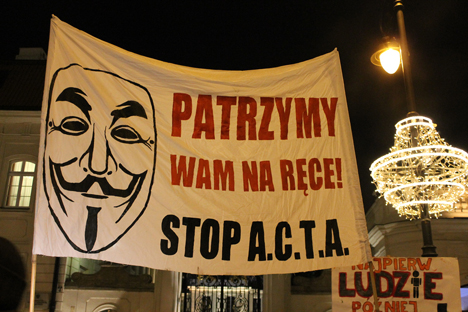
On the border between Poland and Belarus, the Forest has become the subject of a humanitarian crisis. An artist’s report, based on meetings with activists and refugees, charts this contested space. Poetry honours those lost in transit.
Despite residual hostility to state surveillance, the Polish response to the NSA affair both at the political and public levels was strongly pro-American. Will campaigning be able to change mainstream indifference to privacy issues? Anna Wójcik of Res Publica Nowa reports.
Though the Snowden leaks showed that Poland had not been specifically targeted by NSA spying, Donald Tusk, then prime minister, was reluctant to condemn US actions against Germany and France. When the news broke, Tusk commented that “intelligence agencies are not schools of good manners”,1 a statement that contrasted starkly with Angela Merkel’s comparison of the NSA spying with that of the Stasi. While politicians kept silent, advocacy groups stressed the need to clarify the impact of the NSA affair on Poland. “Government, opposition leaders, parliamentary commissions – nobody posed serious questions regarding the impact of Prism on Polish citizens”,2 wrote the lawyers and activists Adam Bodnar and Katarzyna Szymielewicz. The Helsinki Foundation of Human Rights and the Panopticon Foundation, together with the Polish branch of Amnesty International, compiled “100 questions on surveillance to the Polish government”,3 which they addressed to several state institutions. The information was sought on the basis of the Freedom of Access to Public Information Act, which is binding on all publicly funded bodies in Poland. The authorities answered reluctantly at best, and utterly ignored the enquiry at worst. Eventually, the NGOs brought complaints for failure to respond against the prime minister, the interior minister and the minister for foreign affairs.

Anti-ACTA demonstration, Warsaw 27 January 2012. Photo: Sophia Lubieniecka. Source:Flickr
The public response to the government’s refusal of accountability, as well as to the NSA affair as a whole, was one of disinterest. Slacktivism prevailed over any form of collective action, unlike in 2012, when ACTA protests drew thousands to the streets.4 At the same time, a poll on attitudes related to terrorist threats conducted in June 2013 showed that 79 per cent of Poles disagree that the state should be accorded special surveillance prerogatives.5 This stance against old-school surveillance harks back to the experience of the state before 1989. The Polish public were well aware of the communist regime’s widespread use of informants and wiretapping.6 Nevertheless, the more subtle issue of surveillance in democratic regimes has yet to become a major public concern in Poland.
As of February 2014, four per cent of Poles considered Polish-American relations as exceptionally good, the majority of respondents (46 per cent) as neither good nor bad, and a third as fairly good.7 In May 2014, Poles’ view on the US influence on world affairs was more positive than in 2012, with 37 per cent estimating it as fairly positive, the highest result since 2006. A 2014 Pew Survey on Global Attitudes ranked Poland as the European country least opposed to the use of drones, with a third of respondents in favour of this practice.8 It should be noted that these figures are expected to drop in 2015. This is less due to the NSA affair than to the US Senate Intelligence Committee’s report on CIA torture, published in December 2014. The findings embarrassed US allies, including Poland, which held “black sites” on its soil, a fact denied by top Polish politicians for years. While Poles may continue to have a soft spot for the Americans,9 US policy may soon start to be evaluated in Poland by its outcomes and not solely by its heart-warming rhetoric.
Despite President Bronislaw Komorowski’s condemnation of tragic events in Paris at the beginning of 2015 as an “attack on the fundamental values of the free world”,10 the Polish home secretary Teresa Piotrowska assured the public that the country faced no direct terrorist threat. Unlike in other European countries, there were no calls for greater data retention powers.11 Andrzej Lewinski, deputy of the General Inspector of Protection of Personal Data (GIODO), established in 1997, cited Benjamin Franklin when interviewed by Gazeta Wyborcza: “Any society that would give up a little liberty to gain a little security will deserve neither and lose both”.12
Poles do not think highly of domestic legislators, perceive the judiciary as ineffective and the legal system as flawed. They therefore may be more inclined to welcome EU guidelines on issues of valid public interest, such as the forthcoming data protection reforms, despite there being little public discussion about these. Tellingly, among the new Polish MEPs, only Michal Boni and Lidia Geringer de Oedenberg listed privacy issues as priorities.13 Boni, a former minister of Administration and Digitization, has recently commented favourably on a Eurojust proposal to introduce a common European policy on Internet surveillance.14 This conviction seems valid in the light of the Polish authorities’ surveillance activities, which is disproportionately high in comparison to other EU member states. Several Polish law enforcement agencies can request and be granted access to traffic data without a court order. In 2009 there were as many as 27.5 requests per thousand inhabitants, in comparison to 10 in the Czech Republic and 0.2 in Germany, according to the report by the Office for Electronic Communication.15 In 2011, the Polish Ombudsman and Attorney General brought seven joint motions to the Constitutional Tribunal, demanding an enquiry into the constitutionality of existing regulations on surveillance. In 2014, the tribunal ruled that these did indeed violate the constitutional right to privacy.16
In contrast to the data protection reforms, the European Court of Justice 2014 ruling on the “right to be forgotten” was widely commented on. Interest groups expressed their concerns with the ruling. A report by the Confederation of Polish Employers, published in September 2014, agreed that while a right to be forgotten exists, it “should be constructed anew, in a way reflecting the reality of the Internet”.17 The confederation criticized the ECJ for privileging the right to privacy over freedom of the press and freedom of information and called for a more precise and fair apportioning of responsibility to publishers and regulators. This line of argument was also taken by the Ministry of Administration and Digitization, which emphasized that under the current arrangement, deleting the data is technically difficult and costly. It also expressed concerns about the ability of banks to assess credit rating.18
According to a Eurobarometer survey in 2014, 70 per cent of Polish respondents admitted that privacy concerns had not caused them to change how they use the Internet. The survey showed that Polish citizens had relatively few concerns about online banking or online shopping. Poles are also less likely to install anti-virus software or change passwords than other Europeans. This may stem from there being little or no sound knowledge about the risks of cybercrime – just under half of Poles feel well informed about these threats.
Thankfully, there are active campaigners who work to put privacy and digital rights onto the mainstream agenda. The Panopticon Foundation19 and the Helsinki Foundation for Human Rights, with its Media Freedom Observatory,20 are established institutions that run monitoring programmes, publish reports, influence decision makers and trigger debates in the mainstream media. Representatives of these NGOs are seen to be among the most important voices of Polish civil society, as is reflected in numerous rankings, including the annual list of the top Polish lawyers21 and the New Europe 100 list of challengers from Central and Eastern Europe.22 Other non-governmental institutions that are concentrated more on promoting media literacy and awareness of digital rights include the Centre for Civic Education,23 the Modern Poland Foundation24 and Digital Center: Project Poland.25 Local branches of Amnesty International, Human Rights Watch and Transparency International also contribute to raising awareness of these topics in Polish society.
Tusk o aferze szpiegowskiej: Wywiad to nie szkola dobrych manier, RMF 24, 25 October 2013, www.rmf24.pl/fakty/polska/news-tusk-o-aferze-szpiegowskiej-wywiad-to-nie-szkola-dobrych-man,nId,1048931#utm_source=paste&utm_medium=paste&utm_campaign=chrome
Adam Bodnar, Katarzyna Szymielewicz, "Poland's citizens need to know the impact of Prism on their lives", www.theguardian.com/commentisfree/2013/oct/16/poles-prism-poland-surveillance-threat, 16 October 2013
"Thousands march in Poland over ACTA Internet treaty", BBC, 26 January 2012, www.bbc.co.uk/news/world-europe-16735219
Zagrozenie terroryzmem. ["Terrorist threat"], CBOS survey, Warsaw, June 2013. www.cbos.pl/SPISKOM.POL/2013/K_078_13.PDF
Ola Svenonius, Fredrika Bjorkludn, Pawel Waszkiewicz, Surveillance, lustration and the open society: Poland and Eastern Europe [in] Histories of State Surveillance in Europe and Beyond, Routledge Studies in Crime and Society, Routledge, 2014, 95
Stosunki polsko-amerykanskie i wplyw polityki Stanów Zjednoczonych na sytuacje na swiecie ["Polish-American relations and US influence on world affairs"], CBOS survey, Warsaw, May 2014
"Global opposition to US surveillance and drones, but limited harm to America's image", Pew Research Center, 12 June 2014, www.pewglobal.org/2014/07/14/global-opposition-to-u-s-surveillance-and-drones-but-limited-harm-to-americas-image/pg-2014-07-14-balance-of-power-0-01/
Stosunek Polaków do innych narodów ["Poles' attitudes to other nations"], CBOS survey, Warsaw, February 2014
Prezydent potepil atak terrorystyczny na redakcje tygodnika "Charlie Hebdo", 7 January 2015, www.prezydent.pl/aktualnosci/wypowiedzi-prezydenta/inne/art,759,prezydent-potepil-atak-terrorystyczny-na-redakcje-tygodnika-charlie-hebdo.html
GIODO: swiadomosc problematyki ochrony danych i prywatnosci -- wysoka, "Wiadomosci Gazeta.pl", 28 January 2015, http://wiadomosci.gazeta.pl/wiadomosci/1,114877,17321903,GIODO__swiadomosc_problematyki_ochrony_danych_i_prywatnosci.htmlwiadomosci.gazeta.pl/wiadomosci/1,114877,17321903,GIODO__swiadomosc_problematyki_ochrony_danych_i_prywatnosci.html
Cele nowych europoslów 2014 ["Goals of the new MEPs"], Mam Prawo Wiedziec, blog.mamprawowiedziec.pl/2014/05/cele-nowych-europosow-2014_26.html
Krzysztof Majdan, Arkadiusz Przybysz, Unia Europejska chce kontrolowoac internetowe komunikatory, "Wyborcza Biz", 18 February 2015, wyborcza.biz/biznes/1,143821,17427466,Unia_Europejska_chce_kontrolowac_internetowe_komunikatory.html
Panoptykon Foundation, Ile razy panstwo siegalo po nasze dane telekomunikacyjne w 2011 roku? Publikujemy najnowsze dane ["How many times did the state use our telecommunication data in 2011? We publish the most recent data"], News release, 1 April 2012, panoptykon.org/wiadomosc/ile-razy-panstwo-siegalo-po-nasze-dane-telekomunikacyjne-w-2011-roku-publikujemy-najnowsze
Rulings of the Constitutional Tribunal of the Republic of Poland, trybunal.gov.pl/rozprawy/wyroki/art/7004-okreslenie-katalogu-zbieranych-informacji-o-jednostce-za-pomoca-srodkow-technicznych-w-dzialani/
Krzysztof Sobczak, Lewiatan: prawo do bycia zapomnianym trzeba stworzyc od nowa [Lewiatan: the right to be forgotten must be constructed anew], "Lex" 12.09.2014, www.lex.pl/czytaj/-/artykul/lewiatan-prawo-do-bycia-zapomnianym-trzeba-stworzyc-od-nowa
Ministry od Administration and Digitization, Ochrona prywatnosci w sieci. Najczesciej zadawane pytania [Protection of privacy on the Internet: FAQs], mac.gov.pl/en/projekty/ochrona-prywatnosci-w-sieci/najczesciej-zadawane-pytania
Ranking 50 najbardziej wplywowych prawników [Ranking of 50 most influential lawyers], Prawnik.pl, 06 February 2015, www.prawnik.pl/wiadomosci/ludzie-prawa/artykuly/851688,ranking-50-najbardziej-wplywowych-prawnikow.html
Published 27 February 2015
Original in English
First published by Eurozine
Contributed by Res Publica Nowa © Anna Wójcik / Res Publica Nowa / Eurozine
PDF/PRINTSubscribe to know what’s worth thinking about.

On the border between Poland and Belarus, the Forest has become the subject of a humanitarian crisis. An artist’s report, based on meetings with activists and refugees, charts this contested space. Poetry honours those lost in transit.

The politics and psychology of locality: on reviving local communities as high-tech expands and diversifies; forming networks against entropy; the Tortoise Strategy for caring; and rewriting life scripts.